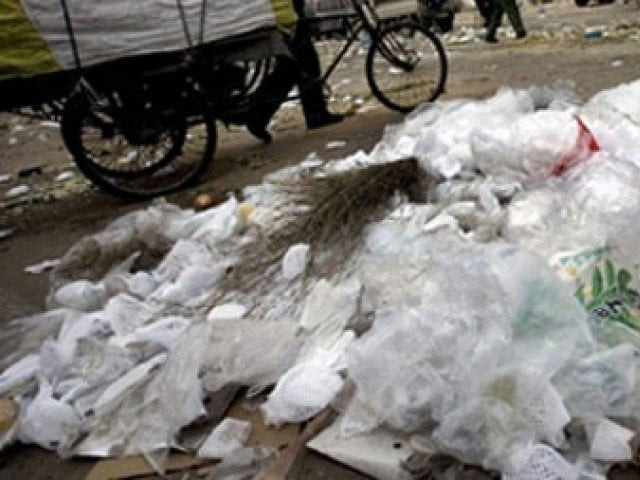Step in the right direction
K-P govt laws against plastic bags are a first in the province

K-P govt laws against plastic bags are a first in the province. PHOTO: AFP
The industry manufacturing these environmental hazards saw a 15% growth rate back in early 2004 with an average of 397 plastic bags used per individual. It was based on this growth rate that the agency made its prediction. Ever since environment was devolved to provinces under the 18th Constitutional Amendment, another survey has not been conducted.
These statistics, though alarming, caused little concern at the time. In 2008, the National Assembly passed a resolution in April demanding plastic shopping bags be banned and replaced by biodegradable ones.
However, it was not until recently that the Khyber-Pakhtunkhwa government took the first and most important step of not just officially banning black shopping bags, but also banning the manufacture of plastic bags less than 30 microns.
The policy devised is based on an extensive study aiming to find a long lasting solution for the problem. There are over 300 plastic manufacturing units in K-P alone. The main concern of the factories and the government is the workforce employed by these units.
Read: Green shopping habits : Biodegradable shopping bags to replace black plastic in K-P
Finding a middle ground
However, certain measures have been taken to avoid any confrontation. While the usage of biodegradable materials will increase the cost of shopping bags, the government now plans to ban the import of cheap quality shopping bags from outside K-P. In addition, equipment will be sent to all district offices of the EPA where deputy commissioners and nazims will be responsible for keeping a constant check on plastic shopping bags used in their districts. Reports will also be filed on a regular basis.
These steps are highly commendable, especially taking the situation in places like Peshawar into account. The provincial capital and other parts of the province see their pipelines choked even during seasonal rainfalls. This results in millions of rupees worth of damage to the drainage and sewerage system.
Changing perceptions
Above all, the public believes the government is not serious about the job at hand. However, most importantly, it is the people who need to understand the environmental hazards of using plastic bags. Unfortunately, legislation alone cannot guarantee a ‘clean and green society’ – to use the famous cliché of the PTI-led government. The masses must be sensitised on the matter.
Read: Non-degradable products: Plastic bags posing environmental hazards
Recent legislation moved in the K-P assembly, through an amendment in the Canal and Drainage Act 1873, increased the fines from Rs50 to Rs20,000. The British-era law allows penalties for anyone blocking sewage lines or throwing polythene bags to clog them. The fines are coupled with a prison term between a month and one year.
About time
The negligence itself is visible. After all, it is only the first amendment in 142 years in an environment that has deteriorated drastically over the last century and a half.
However, the recent steps must be considered a step in the right direction. Credit should be given where it is due; not many previous governments have realised the effects of environmental hazards. The counter argument is that not many governments confronted the kind of environmental hazards K-P has faced in recent times. Regardless, one of the oldest clichés on the book applies aptly to the current situation; desperate times demand desperate measures.
Published in The Express Tribune, October 14th, 2015.













COMMENTS
Comments are moderated and generally will be posted if they are on-topic and not abusive.
For more information, please see our Comments FAQ